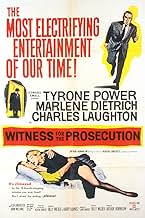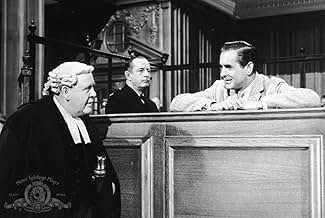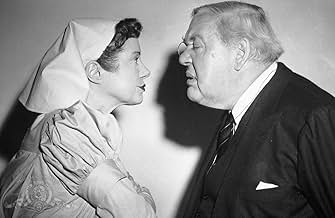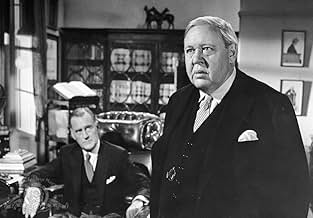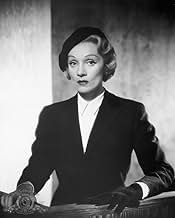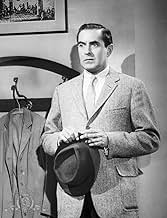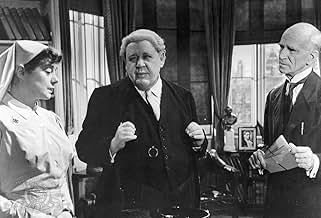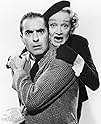A veteran British barrister must defend his client in a murder trial that has surprise after surprise.A veteran British barrister must defend his client in a murder trial that has surprise after surprise.A veteran British barrister must defend his client in a murder trial that has surprise after surprise.
- Nominated for 6 Oscars
- 3 wins & 15 nominations total
Patrick Aherne
- Court Officer
- (uncredited)
Don Ames
- Bar Patron
- (uncredited)
Larry Arnold
- Courtroom Spectator
- (uncredited)
Walter Bacon
- Bar Patron
- (uncredited)
Eddie Baker
- Courtroom Spectator
- (uncredited)
Storyline
Did you know
- TriviaCharles Laughton, who could be moody and difficult, was apparently a dream to work with, throwing himself into the role with dedication and delight. Billy Wilder later recalled a day that was set aside just for shooting reaction shots of the jury and courtroom crowd (composed of extras hired only for the day). Normally, the assistant director would read the actors' lines, and the extras would react. However, Laughton, who was fascinated with the whole process of filmmaking, begged to help. So he came in on his day off and read all of the off-camera speeches to the jury members. He not only read his part but also the judge's, the prosecutor's, and even Marlene Dietrich's. According to biographer Maurice Zolotow in his book "Billy Wilder in Hollywood", "it was an exhibition of craftsmanship such as Wilder had never seen. He believes that Charles Laughton had the greatest technical range and power of any actor, man or woman, whom he has known."
- GoofsWhilst the story is set in London, the script contains several Americanisms such as "cot" for bed, "banana peel" for banana skin, "travel bureau" for travel agents, "roll up" for open, "movie" for film and "Scotch" for Scottish. Whilst some may be intentional, it is odd that Sir Wilfrid or Mrs French would use such colloquialisms. Conversely the US-accented Leonard uses the correct UK "quid" with reference to money.
- Quotes
Sir Wilfrid: I am constantly surprised that women's hats do not provoke more murders.
- Crazy creditsAs the end credits appear on screen, an announcer's voice is heard: "The management of this theater suggests that for the greater entertainment of your friends who have not yet seen the picture you will not divulge to anyone the secret of the ending of Witness for the Prosecution."
- ConnectionsFeatured in Marlene (1984)
- SoundtracksI May Never Go Home Anymore
Music by Ralph Arthur Roberts
Lyrics by Jack Brooks
Sung by Marlene Dietrich (uncredited)
Reprised a cappella by Tyrone Power (uncredited)
Featured review
Yours truly has never been much of a reader, though with one notable exception: the work of Agatha Christie. I absolutely, positively worship this brilliant woman and try to read as many of her novels, short stories and stage play adaptations as possible. "Witness for the Prosecution" is a genuine classic, and although somewhat atypical for Christie, it is undeniably one of the greatest stories ever penned down. There's one major disadvantage about having read all of Christie's whodunits, of course, namely that you can't experience the same astounding twist-in-the-end twice! I would really have loved to be overwhelmed by the climax of this film- version, especially because Marlene Dietrich and Tyrone Power give away such fabulous performances. The story, with its fascinating characters and dazzling plot twists, does remain the movie's biggest strongpoint, but there are a number of more reasons why "Witness for the Prosecution" is righteously considered as one of the most massive milestones in cinematic history. Billy Wilder's surefooted direction, for one, and the stellar performances of the entire ensemble cast. I mentioned Dietrich and Power already, but there's also the downright phenomenal Charles Laughton (arguably the most shamefully neglected actor/director in history) and an appealing supportive role for Elsa Lancaster. But do I daresay that the ultimate success-factor of this stage play adaptation is the masterful re-creation of the court trial? The bombastic settings and decors, the echoing acoustics, the powerful monologues of confident (and arrogant) barristers and the intimidating gowns and wigs are largely what make "Witness for the Prosecution" not only the first but also the mother of all courtroom dramas. This may just be the opinion of an avid fan, but practically ALL great courtroom-dramas that were released from the sixties until present day ("To Kill a Mockingbird", "Philadelphia", "Devil's Advocate", "A Few Good Men"
) were clearly influenced by "Witness for the Prosecution". In fact, I only have one minor complaint: *** Spoiler **** the film version adds one more final twist that I didn't find 100% plausible.
Details
- Release date
- Country of origin
- Languages
- Also known as
- Witness for the Prosecution
- Filming locations
- Production company
- See more company credits at IMDbPro
Box office
- Budget
- $3,000,000 (estimated)
- Gross worldwide
- $7,903
- Runtime1 hour 56 minutes
- Color
- Aspect ratio
- 1.66 : 1
Contribute to this page
Suggest an edit or add missing content


![Watch Trailer [OV]](https://m.media-amazon.com/images/M/MV5BNTM2MjYzMjAtZjI5MC00YTI1LWI2MzAtMWFlNDc2OTU1MTRiXkEyXkFqcGdeQXRyYW5zY29kZS13b3JrZmxvdw@@._V1_QL75_UX500_CR0)
